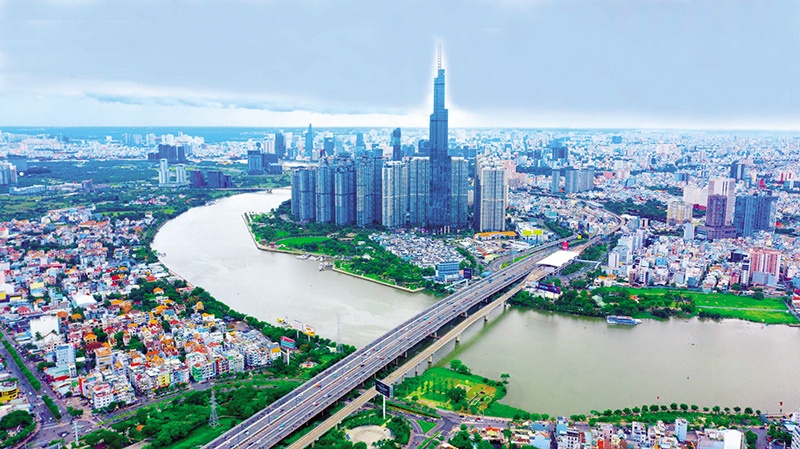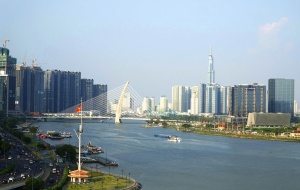INTERNATIONAL INVESTMENT
AND PORTAL
 Nguyen Ngoc Phuc (left) and Truong Da Minh Chau at Nishimura & Asahi law firm
Nguyen Ngoc Phuc (left) and Truong Da Minh Chau at Nishimura & Asahi law firm
Resolution No. 222/2025/QH15, which came into force on September 1, has launched the legal framework for the establishment of the IFC in Vietnam.
Under this framework, Ho Chi Minh City and Danang have been designated as the two pilot locations for developing the IFC model. The resolution represents a landmark step in Vietnam’s strategy to modernise its financial system, attract global capital, and strengthen the country’s position as a regional hub for investment, finance, and technology.
Two months into its implementation, the government has entered the decisive phase of turning this legislative blueprint into enforceable regulations.
On October 14, Deputy Prime Minister Nguyen Hoa Binh chaired a high-level meeting with key ministries, agencies, and local authorities to review the drafting of eight decrees guiding the implementation of Resolution 222. He emphasised that the scope and significance of these decrees are comparable to laws; if not drafted with care and quality, they would fail to meet expectations, cause unintended consequences, and fall short of creating the breakthrough and superior mechanisms envisioned.
Five drafts have already been submitted to the government for consideration, while three are still being refined.
On November 1, Prime Minister Pham Minh Chinh chaired a high-level conference on the establishment of the IFC, declaring that it must be brought into operation within November. Ho Chi Minh City will serve as a major financial hub, with strong development in the areas of securities, bonds, banking, fund management, and listing services. Meanwhile, Danang will focus on developing financial services related to logistics, maritime affairs, free trade, and industrial–agricultural supply chains.
In anticipation of the forthcoming decrees that will guide the implementation of Resolution 222, it is worth revisiting the resolution’s key provisions to highlight the legal and policy foundations shaping Vietnam’s IFC, and to examine what comes next.
IFC membership and exceptional privilegesNot every enterprise may join the IFC, only those that meet strict eligibility criteria shall be licensed as members.
IFC members include key financial institutions such as banks, securities companies, insurance companies, investment funds, fintech firms, market infrastructure entities, and other organisations as prescribed by the competent authority.
IFC members enjoy special privileges that distinguish them from entities operating outside the IFC. First, they may raise international capital with ease, establish holding companies, and obtain foreign loans without prior approval from the State Bank of Vietnam (SBV).
IFC members are also free to engage in business cooperation with foreign partners and among IFC members themselves, without being restricted by ordinary regulations on ownership ratios or investment procedures.
These open-door mechanisms allow capital to flow flexibly within the IFC, connecting Vietnamese enterprises with the global financial network.
Together with privileges come strict obligations to ensure the IFC’s integrity and credibility. Members must comply fully with Vietnamese law, particularly in areas such as anti-money laundering and counter-terrorism financing.
They must also fulfill all tax obligations, prepare financial statements, and disclose information transparently in accordance with international standards.
High operational standards are also imposed, including system security, customer data protection, and strict risk management governance. Enterprises that violate or fail to meet the prescribed standards may have their membership revoked.
An open door for foreign investors
The IFC offers unprecedented openness for foreign investors, a truly wide-open door without precedent.
Foreign investors are permitted to hold up to 100 per cent ownership in enterprises established within the IFC, instead of being subject to ownership caps as in the stock market or in many conventional business sectors.
They may also establish new enterprises within the IFC without undergoing the usual investment policy approval procedures, thereby significantly reducing the time and cost of market entry.
In particular, capital contributions and share acquisitions in IFC enterprises are not required to be registered with regulatory authorities, unlike investments in Vietnamese enterprises outside the IFC.
These bold reforms make the IFC a destination that is easy to enter, easy to exit for global capital flows, where administrative procedures are streamlined to the greatest extent possible.
Unprecedented tax incentivesThe tax regime at the IFC is considered groundbreaking and unprecedented in the history of Vietnam’s investment incentive policies.
Under the preferential framework, enterprises operating in priority sectors are entitled to a corporate income tax rate of only 10 per cent for a period of up to 30 years – significantly lower than the current standard rate of 20 per cent.
In addition, these enterprises are granted a full tax exemption for the first four years, and a 50 per cent reduction of payable tax for the subsequent nine years. For other projects (not falling within priority sectors), a corporate income tax rate of 15 per cent applies for 15 years, together with a tax exemption for the first two years and a 50 per cent reduction for the next four years. These deep and rare incentives provide IFC enterprises with a major competitive advantage in tax costs.
For individuals, the preferential policies are equally attractive. Experts, managers, scientists, and highly skilled employees working at the IFC are exempt from personal income tax on salaries and capital transfer income until the end of 2030. This policy not only helps attract talent and high-level professionals but also encourages them to commit long-term, fostering a high-quality financial community in Vietnam.
Fintech sandbox driving innovationTo keep pace with the global boom in fintech, the resolution establishes a bold sandbox mechanism for the IFC.
The sandbox serves as a controlled experimental environment where enterprises are permitted to test new financial technologies, products, and business models even when the existing legal framework does not yet provide appropriate regulations.
Under normal conditions, a new fintech idea might be stalled due to regulatory gaps, but within the sandbox, enterprises may proactively pilot such services within defined limits and under the special supervision of regulatory authorities. Notably, if damages occur during the testing phase despite the enterprise’s full compliance with procedures, both the enterprise and the regulator are exempt from administrative, disciplinary, and civil liabilities.
 Establishing an IFC will ramp up Ho Chi Minh City’s status regionally and internationally
Establishing an IFC will ramp up Ho Chi Minh City’s status regionally and internationally
The budgets of Ho Chi Minh City and Danang may also be used to compensate enterprises participating in the sandbox in cases of unforeseeable risks. This sandbox policy establishes a safe and flexible testing space that promotes innovation and allows breakthrough fintech ideas to take shape.
Modern and internationally integrated legal frameworkThe legal environment at the IFC is designed to be flexible and closely aligned with international practices, providing assurance to foreign investors and global financial institutions.
The parties conducting cross-border transactions may agree to apply foreign law (except in the field of real estate, which remains governed by Vietnamese law).
This enables parties to international financial transactions to choose the legal system most familiar to them, thereby minimising legal risks arising from differences between jurisdictions.
In addition, English is recognised as the official language for all IFC activities, including contracts, reports, transactions, and proceedings. This is a major breakthrough, transforming the IFC into a bilingual environment within Vietnam, allowing international investors to operate as seamlessly as they would in a developed financial centre.
Disputes arising within the IFC may be resolved expeditiously through international arbitration, with arbitral awards being final and binding.
The parties may even agree to waive recourse to Vietnamese courts in order to avoid lengthy litigation. The diversification of dispute resolution options, particularly through international arbitration, is a key factor in building investor confidence, as it ensures that their rights will be adjudicated by an independent judicial mechanism in accordance with global standards.
The governance model of the IFC consists of three specialised bodies: (1) an executive body responsible for day-to-day operations, (2) a supervisory body ensuring member compliance and risk management, and (3) a dispute resolution mechanism comprising an international arbitration centre and a specialised court for the IFC. This structure aims to establish an independent legal and judicial framework that meets international standards.
Land incentives and ‘shortcut’ administrative proceduresIn addition to financial incentives, the government has introduced exceptional advantages in land use and administrative procedures to shorten project implementation timelines within the IFC.
Specifically, priority projects or large-scale projects in the IFC may be allocated or leased land for up to 70 years, whereas current law generally limits land-use terms to 50 years in many cases, with renewal procedures often being complex.
The 70-year term is nearly equivalent to that of leading global special economic zones. For other projects within the IFC, the maximum land-use term is also 50 years and may be extended with ease.
Foreign-invested enterprises in the IFC are also permitted to mortgage their land-use rights to foreign credit institutions, a mechanism never before available in Vietnam.
This provision is particularly advantageous, as large projects typically require international financing, and foreign banks are more confident in accepting collateral under the IFC’s open and internationally aligned legal framework. This mechanism facilitates access to global capital for IFC enterprises while easing the burden on the domestic credit system.
Regarding construction procedures, all processes within the IFC are streamlined to the greatest extent possible. Investors are not required to obtain separate approvals for detailed planning or individual construction permits; instead, they need only register a commitment to comply with technology and environmental standards before commencing construction. This significantly shortens the project preparation period, as obtaining planning approvals and construction permits under normal conditions may take several months or even years.
In a global investment landscape where capital flows constantly compare regulatory efficiency among jurisdictions, project implementation speed is a decisive factor.
With its far-reaching procedural reforms, the IFC in Vietnam will stand out as a highly attractive destination for international investors, reflecting Vietnam’s strong commitment to flexibility and efficiency.
Challenge: the risk of becoming an ‘isolated enclave’Global experience shows that an IFC's value depends on how well it connects with its host economy. Different governance models yield distinct outcomes:
*Singapore demonstrates successful integration of global and domestic financial goals. Its Asian Dollar Market initiative (1970s) initially separated offshore and domestic banking but operated through the same global institutions. Gradually, Singapore eased currency restrictions, built deep local capital markets, and encouraged foreign issuers to raise funds in Singapore dollars. Finance now contributes about 15 per cent of GDP, and domestic firms access international capital through local banks and exchanges.
*Hong Kong shows how an IFC can connect an emerging economy to global markets while maintaining control. Initiatives such as Stock Connect (2014) allow foreign investors to trade mainland-listed shares through Hong Kong under daily quotas and Hong Kong’s legal system, while Southbound Connect enables Chinese investors to invest abroad.
These controlled channels direct capital into Chinese firms without full liberalisation, maintaining regulatory oversight and currency stability.
*Cayman Islands and the British Virgin Islands (BVI) represent enclave IFCs. Although they host vast amounts in hedge funds and special-purpose vehicles, their small domestic economies gain little real investment.
Benefits are largely limited to fees, taxes, and professional services, with minimal local economic transformation. These centres prosper through tax and regulatory advantages, but remain detached from national development.
In Vietnam, although the IFC policy is designed to be open and highly integrated, the link between the IFC and the domestic economy remains a major question.
At present, the preferential mechanisms on foreign exchange, taxation, and investment apply only within the IFC, while transactions between IFC members and domestic enterprises are still governed by existing regulations. Without a clear roadmap for integration, the IFC risks becoming a ‘special financial zone’ operating in isolation, serving primarily the circulation of foreign capital among its members rather than acting as a genuine gateway for global capital to flow into Vietnam’s production, infrastructure, and innovation sectors as originally intended.
In other words, in Vietnam, a key challenge is to prevent the IFC from becoming an ‘isolated enclave’ detached from the rest of the economy.
Lessons from several countries have shown that, if poorly designed, special financial zones may bring only limited benefits to the domestic economy. Local enterprises may find it difficult to access capital and services from the IFC, foreign capital may circulate mainly within the zone, and the manufacturing sector as well as small- and medium-sized enterprises may fail to benefit.
The IFC must therefore play an active role in supporting the development of Vietnam’s domestic capital market, expanding funding access for Vietnamese enterprises, and elevating the country’s financial service standards to a new level.
Legal finalisation: ready for takeoffThe resolution has taken effect and established the IFC’s legal foundation. The Prime Minister’s latest directive - to operationalise the IFC within November - demonstrates Vietnam’s determination to move swiftly from legislative design to implementation.
The next decisive step is the issuance of the eight guiding decrees, covering the establishment of the IFC in Ho Chi Minh City and Danang; financial and fiscal policies; banking licensing, foreign exchange, and anti-money laundering measures; trade and digital platforms; labour and social security; land, construction, and environmental matters; arbitration and dispute resolution; and residence and immigration policies.
These are all entirely new and complex issues that require meticulous drafting and consultation with experts. The prompt completion of a consistent and coherent legal framework is the key for the IFC to take off successfully.
In a nutshell, Resolution 222 represents a defining milestone in Vietnam’s ambition to build an open and globally connected financial system.
Two months after its entry into force, the momentum has shifted towards implementation, as the government works proactively to translate the resolution into detailed regulations and operational mechanisms.
The strong determination to finalise the eight guiding decrees underscores Vietnam’s commitment to turning the International Financial Centre from a legal concept into a dynamic financial ecosystem.
With coherent regulations, effective coordination, and a balanced approach between openness and stability, Vietnam is well positioned to transform legislative vision into tangible progress and sustained growth.
 IFC moves reflect long-term ambitions
IFC moves reflect long-term ambitions
To align with plans for international financial centres in Vietnam, many major domestic and international financial institutions have repositioned their strategies, adjusted development plans, and relocated investments.
 Ho Chi Minh City pushes ahead with $6.88bn financial hub
Ho Chi Minh City pushes ahead with $6.88bn financial hub
Ho Chi Minh City is accelerating plans to establish a $6.88 billion International Financial Centre (IFC), with local authorities instructed to finalise the project report this month.
 Danang and Ho Chi Minh City IFCs poised for integration
Danang and Ho Chi Minh City IFCs poised for integration
In Vietnam’s strategy to establish itself as an international financial hub, Ho Chi Minh City is positioned as the nation’s liquidity powerhouse, while Danang city serves as an instrumental arm, amplifying its appeal and strengthening market connectivity.



















